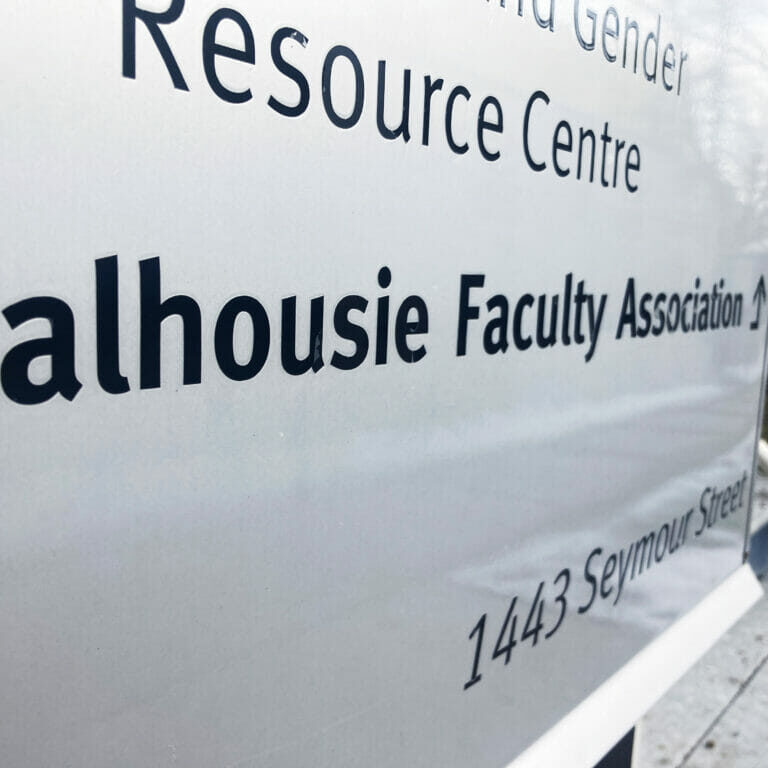
Dal faculty have mixed feelings about return to class
While some are ‘counting down the minutes’ to be back in the classroom, others are staying remote
Tara Perrot, the president of the Dalhousie Faculty Association (DFA) left a meeting with Dalhousie University’s acting provost and vice-president academic Frank Harvey in January feeling “disappointed and cut out,” she said.
The meeting was called by the DFA in hopes to get more information for faculty about the return to in-person classes. But Perrot said by the end of the meeting, the only information conveyed could already be found in Dalhousie’s return to campus memo from Jan. 14.
“I’m worried it’s going to be a shit show,” said Perrot.
DFA wants more details
Perrot said it seems many of the details in the shift back to in-person learning have been left up to individual professors.
“Some find this okay because it lets them stay online if they choose, but most people would like some more details and some more accommodations.”
One of Perrot’s main concerns is masks. She said she asked Harvey if professors who chose to go in-person would be provided with N-95 masks. N-95 and KN-95 masks are considered the highest level of protection against COVID-19, according to the Government of Canada.
In response, Perrot said the DFA received instructions on safely wearing medical and non-medical masks in lieu of being provided N-95s. “It seemed like the university was trying to talk us out of N-95s,” she said.
Perrot said the information faculty have received is no different than information students have received about the shift to online classes.
“Many faculty members want to be going in person and many want to stay online. So it is good that they are being provided with a choice,” Perrot said. “What we’re not being provided with is a plan. What happens if a professor gets sick? Or a student? We’re told to contact the administration in that scenario, but details about testing, sick days, going back online, that’s all unclear.”
Perrot said the best-case scenario involves everyone doing their best to limit contacts, faculty all making their best personal plans, and numbers steadily going down. Worst case scenario, she fears, is the possibility of massive outbreaks, forcing the university back online and the Omicron wave to resurge in the province.
A professor excited to get back to the classroom
Different faculty members have varying perspectives on the return to class. History professor Gregory Hanlon said he’s “counting down the minutes” until he can return to the classroom.
“You can’t be cut off from other people, from society, for too long. It just doesn’t do good things for people.”
Hanlon said some people go too far in being irresponsible about COVID-19, citing the now infamous homecoming street parties of 2021, but he also believes many people can be overly cautious.
“Some people seem to allow fear to be the guiding force in their decisions to the point where it paralyzes them, this doesn’t seem wise,” he said.
Hanlon said the school has done well allowing for faculty members to have autonomy over their classrooms, and he said they’re giving out the best information they can given what is available.
“The numbers [of COVID-19] are very high but the lethality, especially for young people, is very low,” said Hanlon. “There comes a time when you have to weigh the odds, take the proper precautions and get on with it.”
Hanlon sees the in-person experience as crucial to university education.
“When you consider the importance of students interacting with each other, debating and discussing subjects face to face,” he said. “I think it’s totally worth getting back into the classroom.”
Hanlon said there are other options for those who’d like to be cautious. “People who insist on an online experience can go to another institution for their education, now these primarily online institutions don’t normally have the best reputation, but you can go if you’d prefer,” said Hanlon, referring specifically to Athabasca University as an example.
A professor staying online
International development professor Ajay Parasram sees things differently. He’s one of the many professors choosing to keep his classes online for the semester.
“My partner is immunocompromised. I don’t know which students or other faculty may be vulnerable. I’d rather minimize risk by staying online.”
Parasram hopes the university will provide N-95 masks and better backup plans in the case of an outbreak. But he is much more critical of the province than the university.
“I feel like the university in some sense is following the public health guidelines, but the problems I see are resting in the public health guidelines right now,” he said. He believes the Omicron variant shouldn’t have been characterized as mild and thinks public health is much more relaxed than they were during previous waves, despite rising deaths.
Parasram thinks professors should be consulting with students before going entirely in person.
“I love teaching in person, I can’t wait to get back to it. But I’d rather do it when it’s safer to do so,” he said. He says as of now, he sees increased outbreaks on campus and in the province as inevitable due to the return to in-person classes.
Perrot said she thinks it’s very close to an even number of faculty who prefer staying online or prefer going back in person. “I think going forward everyone needs to be cautious, but also they should expect the university to listen more to its community,” she said.






